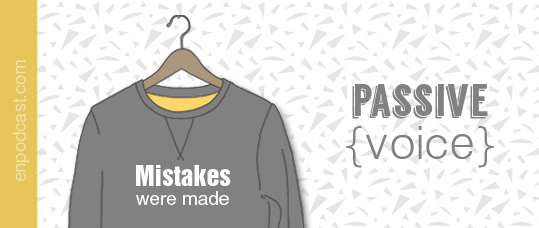Passive Voice
Passive Voice is the topic thatis used everywhere and by everybody. In today's podcast you will hear about its form and usage, and also about different small but important details. So let's begin.
Form
The passive is formed with to be + past participle.
The verb to be must be changed according to the grammar tense you want to use;
past participle is a regular verb with the ending –ed or an irregular verb in the third form.
There is a sentence in the active form: People make tables.
Here are the passive forms of it in different tenses.
|
Present Simple |
Tables are made every day. |
|
Past Simple |
A table was made yesterday. |
|
Future Simple |
A table will be made tomorrow. |
|
Present Continuous |
A table is being made at the moment. |
|
Past Continuous |
A table was being made yesterday at 5 pm. |
|
There is no passive form of the Future Continuous. |
|
|
Present Perfect |
A table has already been made. |
|
Past Perfect |
A table had already been made yesterday before 5 pm. |
|
Future Perfect |
A table will have been made tomorrow by 5 pm. |
|
Luckily we don't use Perfect Continuous tenses in the passive voice. |
|
|
Modal verbs |
A table must be made today. |
|
Going to |
A table is going to be made tomorrow. |
Usage
What are the reasons for using the passive? There are a few of them:
- The agent (or ‘doer') of the verb is obvious
A criminal was arrested.
(It's obvious the police arrested the criminal)
- The agent is unknown
The bike has been stolen.
(We don't know who has stolen it)
- The agent is unimportant
The animals are kept in cages.
(It's not important who does this)
- A process is more important than the agent
First meat must be chopped in small pieces and then fried quickly at high heat.
(We need to describe a process itself)
In English, the main topic of the sentence usually comes at the beginning, and the new information about the topic
comes at the end.
James Cameron directed ‘Avatar'.
(The director Cameron is the main topic of the sentence)
‘Avatar' was directed by James Cameron.
(In this sentence the film ‘Avatar' is more important)
If we want to draw attention to the object we use the passive voice. If the doer is also important we use the preposition by to mention it.
However, sometimes we use the preposition with to talk about an instrument which is used by the doer to do something.
The movie ‘Avatar' was filmed with IMAX cameras.
Context
We usually avoid the passive in informal language. We can use you or they to refer to people in general.
You can switch the TV on with our mobile phone.
They expect to launch their advertising campaign next month.
The passive is preferred to make the style more formal. It is common in newspapers and academic writing because it makes the style more impersonal and objective.
The TV can be switched on with our mobile phone.
The advertising campaign is expected to be launched next month.
To find out more about this grammar point listen to our podcast ‘Impersonal Structures'
Active into Passive
Quite often if we write a formal report it is better to use the passive voice. So how to change a sentence in the active into the passive? Let's look at a few examples.
We held the conference on 5th April.
(The sentence is in the Past Simple Active, the object of the sentence is the conference. We are active, the conference is passive and it will be our subject in the passive voice)
The conference was held on 5th April.
We are going to organize two workshops for customer officers.
(Two workshops will be the subject in the passive voice)
Two workshops are going to be organized for customer officers.
(Please, don't use ‘by us' because this information is not important and not common)
I hope this podcast will motivate you to use the passive more often.
Thanks for listening.
















